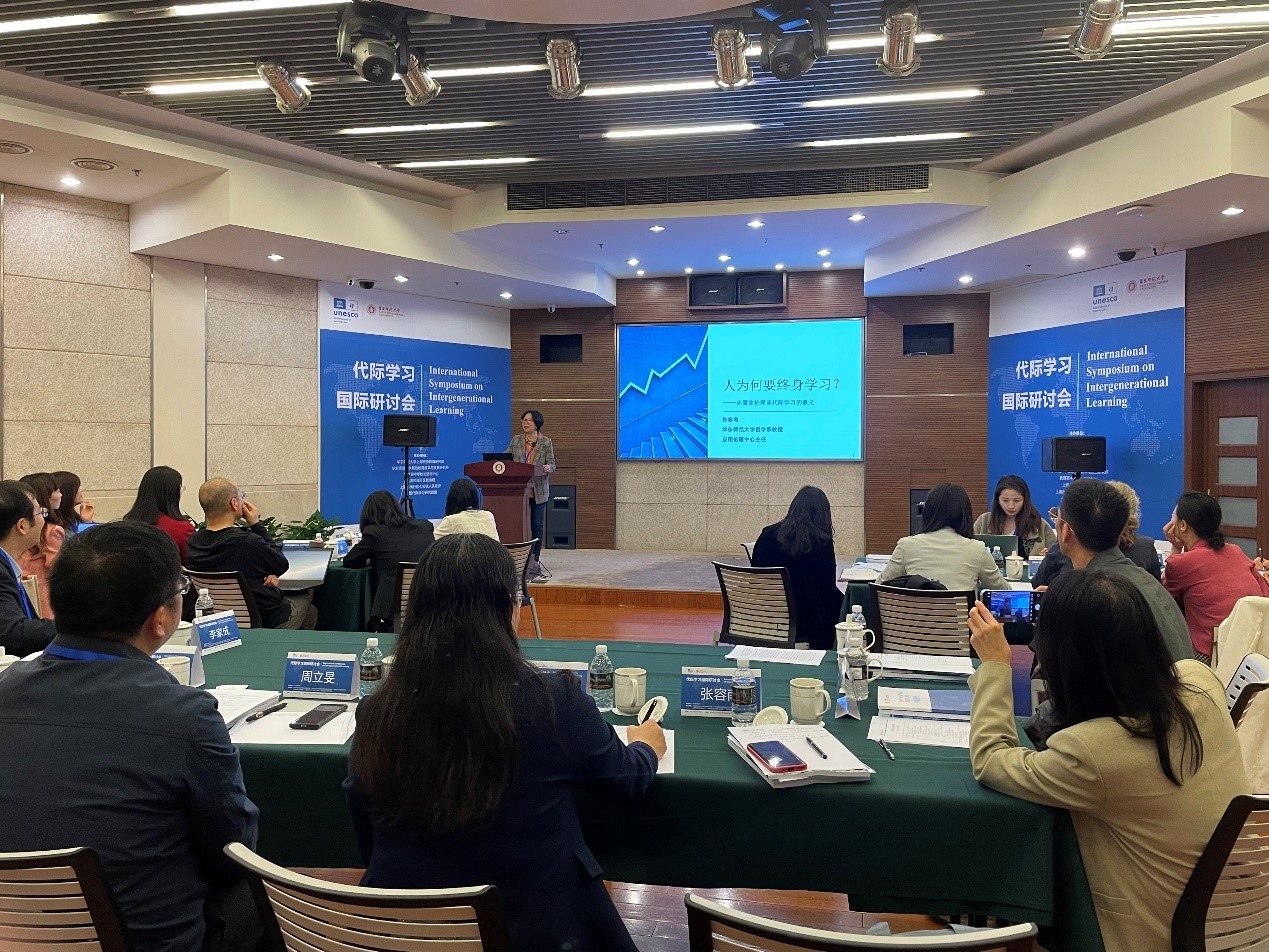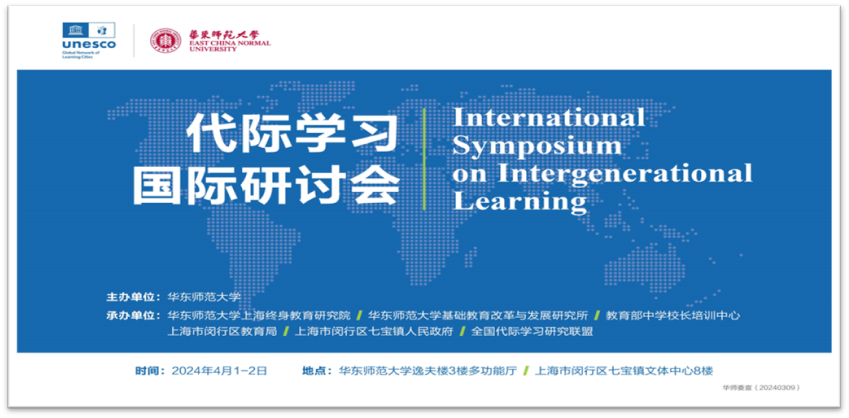East side of 7th Floor, No. 3663, North
Zhongshan Road, Shanghai, China, 200062
Tel: +86 21 6223 2322
www.smile.ecnu.edu.cn
On April 1, 2024, the International Symposium on Intergenerational Learning was officially opened in Shanghai. The event was hosted by the East China Normal University (ECNU) and co-organized by the Shanghai Municipal Institute for Lifelong Education (SMILE) of ECNU, the Institute of Schooling Reform and Development of ECNU, the Training Center for Secondary School Principals of the Ministry of Education (MOE), the Bureau of Education of Minhang District of Shanghai, the People's Government of Qibao Town of Minhang District of Shanghai, and the National Alliance for Intergenerational Learning Research (NALR), and presided over by Li Jiacheng, the Executive Vice President of the SMILE of ECNU. Thirty-eight education researchers from Beijing, Shanghai, Hangzhou, Wuhan, Changsha and Changzhou in China, as well as from Australia and South Korea, gathered in Shanghai on April 1st, and the event was also open to about 100 parents and representatives of primary and secondary school teachers on April 2nd. Program officers and professors from the UIL, the University of Tokyo in Japan, and the University of British Columbia in Canada also participated in the international symposium through a variety of means, including online. The actual number of foreign guests attending the meeting was 6. The meeting was conducted in the form of high-density interactive exchanges, and no Chinese or foreign papers were collected and no proceedings were published.
Focusing on the theme of intergenerational learning, this conference endeavors to depict a new scenario of learning together and learning with each other, and to develop the knowledge system in this field. On the opening day of the conference, delegates focused on the core topic of "Practical Innovation and Knowledge System Construction of Intergenerational Learning" and fully discussed the connotation and contemporary value of intergenerational learning, the relationship between intergenerational learning and the construction of learning society, and the international comparative study of intergenerational learning. In this international conference, scholars from international organizations and many countries, such as Rakhat Zholdoshalieva, Project Officer of UIL, Dr. Ann Hill of the University of Canberra, Australia, and Prof. Atsushi Makino of the University of Tokyo, Japan, shared various research results, which broadened the international vision of the attendees; researchers rooted in China also advocated the understanding of the value of intergenerational learning based on Confucian culture. Researchers with roots in China also advocated recognizing the value of intergenerational learning based on Confucian culture, emphasized the need to promote continuous innovation in intergenerational learning in the era of digital intelligence, and shared rich practical development results.
The April 1 meeting also released research results such as the Outline of Intergenerational Learning Research, the Outline of Construction of Age-Friendly Schools, the Strengthening Intergenerational Learning, Promoting Intergenerational Harmony, and Realizing Innovative Development - Initiative for Action by Senior Universities, and the Initiative for Strengthening Global Cooperation in Intergenerational Learning Research.
Prof. Atsuko Niiho from Waseda University, Japan; Dr. Ann Hill from the University of Canberra, Australia; and Prof. Yixian Choi from Kyung Hee University, South Korea, together with Prof. Jiacheng Li, Executive Vice President of SMILE of ECNU, and Prof. Mang Feng from the School of Philosophy and Law and Politics, Shanghai Normal University, discussed the innovative paths of development of intergenerational learning. Meanwhile, Editor-in-Chief Wang Xiangrong of Guangming Daily Educator Magazine and Editor Yang Zhiping of New Curriculum Review Magazine made wonderful comments to expand participants' thinking. Representatives from Shanghai, Changzhou, Jiangsu, Anji, Zhejiang, and Hefei, Anhui participated in the seminar and exchanged ideas, contributing wisdom and strength to the research and practice of intergenerational learning.
Representatives of this symposium called for continuing to strengthen the practical changes in intergenerational learning, promoting the construction of knowledge systems, continuously improving the policy support system, and striving to open a new era of intergenerational learning. The results of the conference were widely disseminated through mass media such as China Education News Network and Guangming Network after the conference, and academic exchanges were further deepened. Later on, the organizers continued to host relevant academic salons to further form relevant theoretical results, which will continue to be integrated into the construction of China's autonomous knowledge system in this field. The chairperson of this conference, Prof. Li Jiacheng, also went to Philadelphia, USA in April to continue to disseminate the research results of intergenerational learning in China at the AERA conference, which was well received. Relevant scholars and government officials, principals of primary and secondary schools and universities for the elderly are also continuing to collaborate and invest in the research in this field, which will continue to open up new horizons for development.

